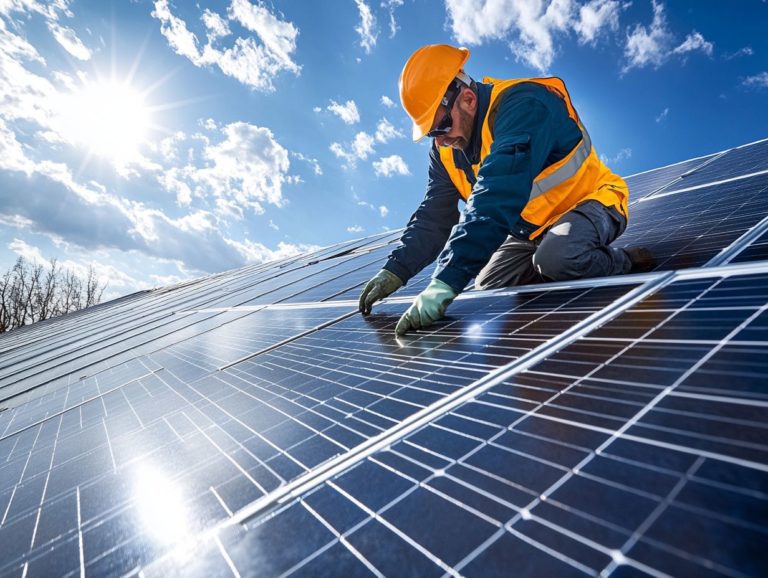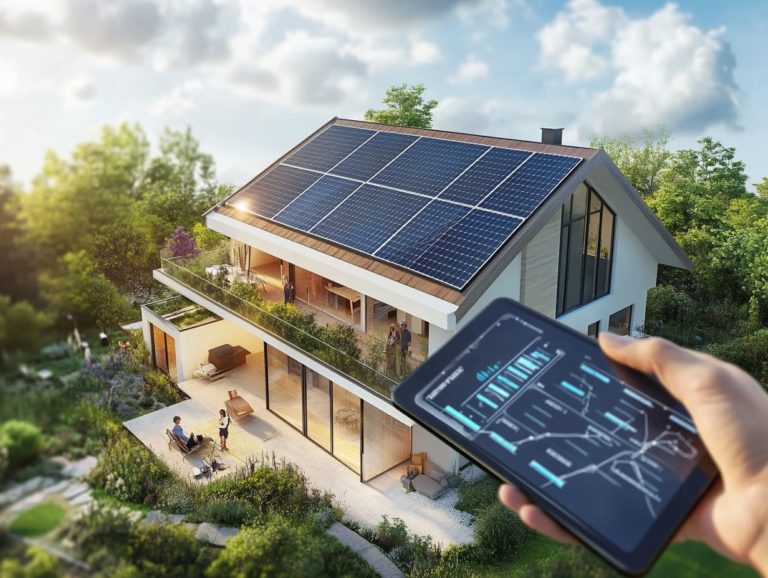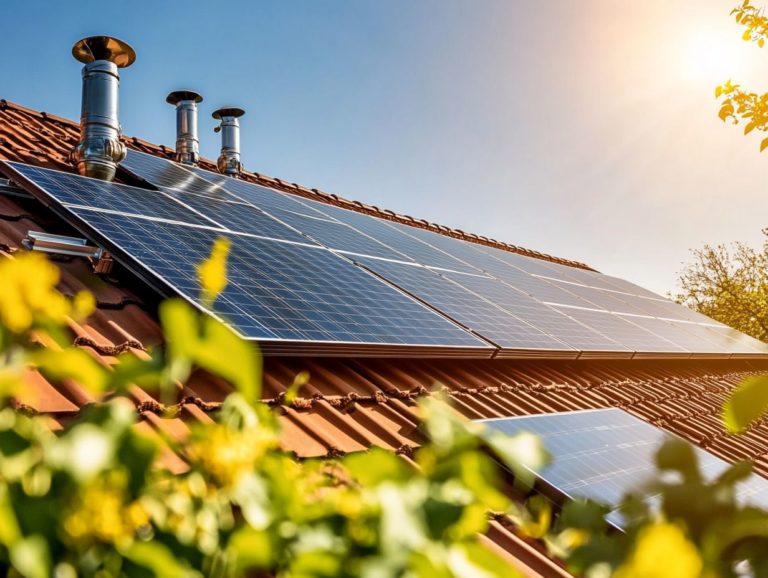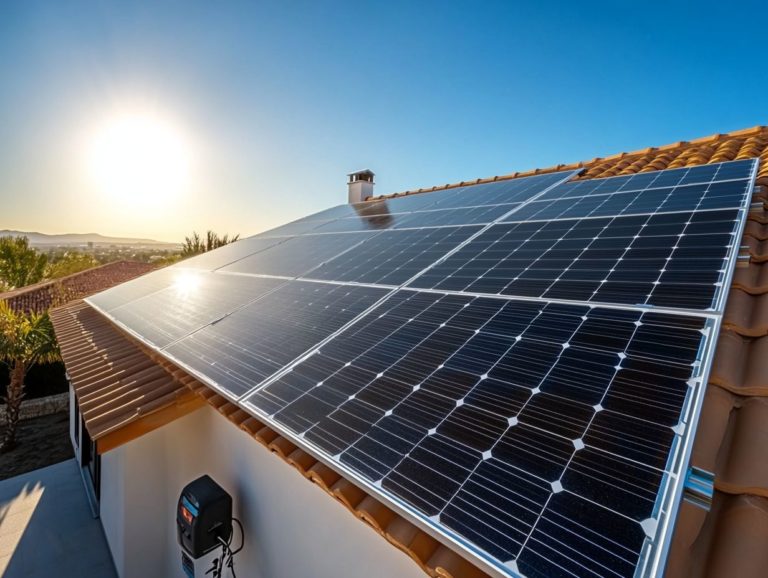“5 Ways Solar Energy Can Benefit Rural Homes”
In a world where energy costs continue to climb and environmental issues take center stage, solar energy stands out as a compelling solution for rural homes.
This article delves into five key benefits of embracing solar power, ranging from lowered energy bills to greater energy independence. It outlines the mechanics of solar energy, the different types of systems available, and the enticing incentives that can make installation more attainable for you.
Discover how solar energy can transform your rural living experience!
Contents
- Key Takeaways:
- 1. Reduced Energy Costs
- 2. Increased Energy Independence
- 3. Minimal Environmental Impact
- 4. Availability of Government Incentives
- 5. Improved Resilience and Reliability
- How Does Solar Energy Work?
- Frequently Asked Questions
- What is the benefit of using solar energy in rural homes?
- How can solar energy save money for rural homeowners?
- Can solar panels be set up in remote areas?
- What are the extra perks of using solar energy?
- How does solar energy supply reliable electricity?
- Are there incentives for installing solar panels in rural areas?
Key Takeaways:
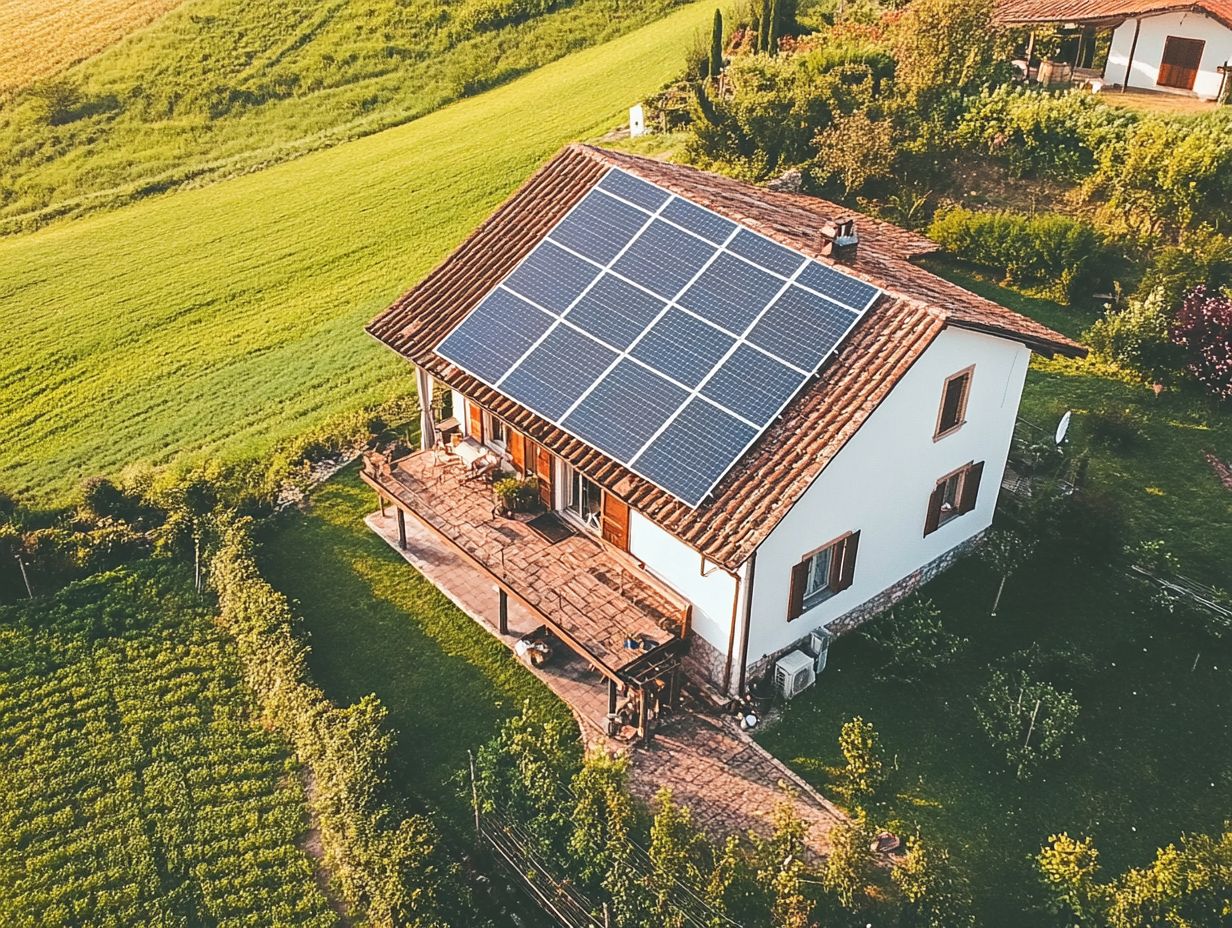
- Reduce energy costs and increase energy independence with solar energy for rural homes.
- Solar energy drastically reduces environmental harm!
- Solar energy can improve resilience and reliability.
- Rural homeowners can benefit from government incentives and save money in the long run.
1. Reduced Energy Costs
One of the most compelling benefits of embracing solar energy technology is the remarkable reduction in energy costs. Switching to solar energy can lower your electric bills. At the same time, you ll help create a sustainable future.
Investing in solar panels allows you to harness sunlight to generate your own electricity, leading to long-term savings and decreased reliance on traditional energy sources.
Solar panels work by converting sunlight into electricity using special solar cells that change sunlight into electricity. This minimizes the energy you need to purchase from utility companies and generates power during peak hours when rates are typically highest.
You may find that this transition brings immediate solar savings on your monthly bills, as surplus energy can often be sold back to the grid in many regions.
While the initial investment in solar installation might appear daunting, the financial benefits present a compelling case for making the switch. You could see a substantial return on investment, thanks to reduced energy costs and favorable incentives that come with adopting this innovative technology.
2. Increased Energy Independence
Embracing solar technology can significantly elevate your energy independence, giving you the power to produce your own energy and lessen your reliance on external energy suppliers.
By utilizing solar power systems and integrating solar batteries, you can store energy for later use. This ability protects you from changing energy prices and supports a sustainable lifestyle.
With the increasing investment in solar installations, you can tap into the sun’s abundant energy, reducing your carbon footprint and lessening your dependency on fossil fuels.
As technology evolves, storage capacity continues to improve, enabling you to optimize your energy use even on cloudy days or at night. The cumulative effect of these practices leads to greater energy security, allowing you and your community to flourish in an era where renewable solutions are essential.
3. Minimal Environmental Impact
The integration of solar energy into your power systems offers a remarkably low environmental impact compared to fossil fuels, making it an essential element in your transition to renewable energy.
By embracing solar solutions, you can significantly reduce greenhouse gas emissions, promote cleaner air, and pave a sustainable path for future generations.
As more households and businesses like yours adopt this clean energy source, there s a collective movement towards a greener economy that values environmental health. Solar energy plays a crucial role in mitigating pollution levels, cutting down on harmful emissions that drive climate change.
The solar market is evolving not only in technology and efficiency but also in its commitment to sustainability as a whole. Concerns about solar waste and disposal are gaining traction, inspiring innovators to create recycling methods and second-life uses for solar components.
This comprehensive approach ensures that while you harness the sun s power, you also uphold your responsibility as a steward of the planet.
4. Availability of Government Incentives
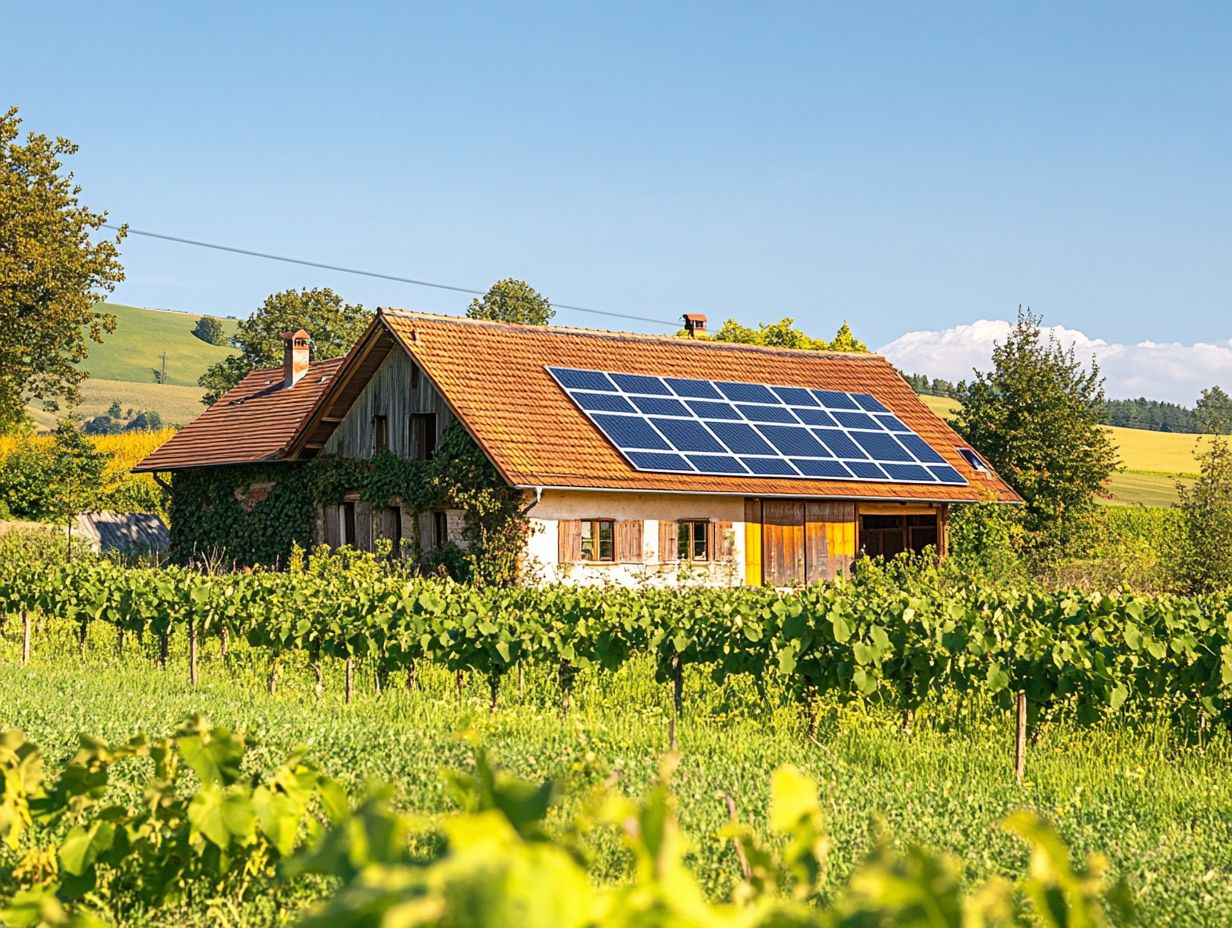
Government incentives are crucial for adopting solar energy. They make installations affordable and attractive.
Federal tax credits can cover a large part of installation costs. State rebates directly lower prices, and grants support community solar projects.
These aids lower upfront costs and create jobs in the renewable sector, boosting local economies.
By utilizing these programs, you can transition to solar energy smoothly. This leads to long-term savings on energy bills and a reduced carbon footprint.
5. Improved Resilience and Reliability
Solar energy systems are known for their reliability and resilience, providing you with a dependable power source. They can navigate disruptions in traditional energy supply chains with ease.
By harnessing solar generators and optimizing solar efficiency, you can enjoy consistent electricity, even during challenging circumstances. This ultimately strengthens your energy security.
These systems also work with battery storage, allowing you to store surplus energy generated on sunny days. You ll have energy at your disposal even when the sun takes a break.
With options like solar water heating and solar-powered appliances, you can create a versatile energy portfolio that reduces your reliance on grid electricity.
This independence not only cuts utility costs but also promotes a more sustainable energy ecosystem making it a smart choice for anyone navigating the unpredictable landscape of energy supply.
How Does Solar Energy Work?
Solar energy harnesses the sun’s power through solar cells that convert sunlight into electricity for your home or business. This innovative process allows solar systems to deliver renewable energy, reducing your reliance on fossil fuels and paving the way for a sustainable future.
When sunlight hits the solar cells, it excites the electrons within the material, usually silicon, generating an electric current. An inverter is a device that changes direct current (DC) electricity into alternating current (AC) electricity, making it compatible with your home s electricity.
By tapping into solar power, you can save big on your electricity bills and minimize your carbon footprint. As technology advances, the efficiency and affordability of solar systems continue to improve, making clean energy more accessible and appealing.
Embracing solar energy promotes energy independence and contributes to a healthier planet.
What Are the Different Types of Solar Energy Systems?
You have a wealth of solar energy systems available, each designed to meet different energy needs. From solar panels that generate electricity to solar water heating systems and innovative solar lighting solutions, understanding these options gives you the power to select the system that best aligns with your energy requirements.
Among the most sought-after are solar panels, which convert sunlight into electricity, making them ideal for both residential and commercial use. Solar water heating systems capture the sun’s warmth to heat water for domestic use, delivering significant savings on your utility bills.
Consider solar appliances designed for efficiency they operate on solar energy, further reducing your reliance on traditional energy sources. Advancements like solar batteries provide energy storage, ensuring you have power available even during cloudy days or at night, enhancing the overall functionality of your solar setup.
With these diverse options, you can effectively customize your energy solutions to suit your unique needs and goals.
What Are the Initial Costs of Installing Solar Panels?
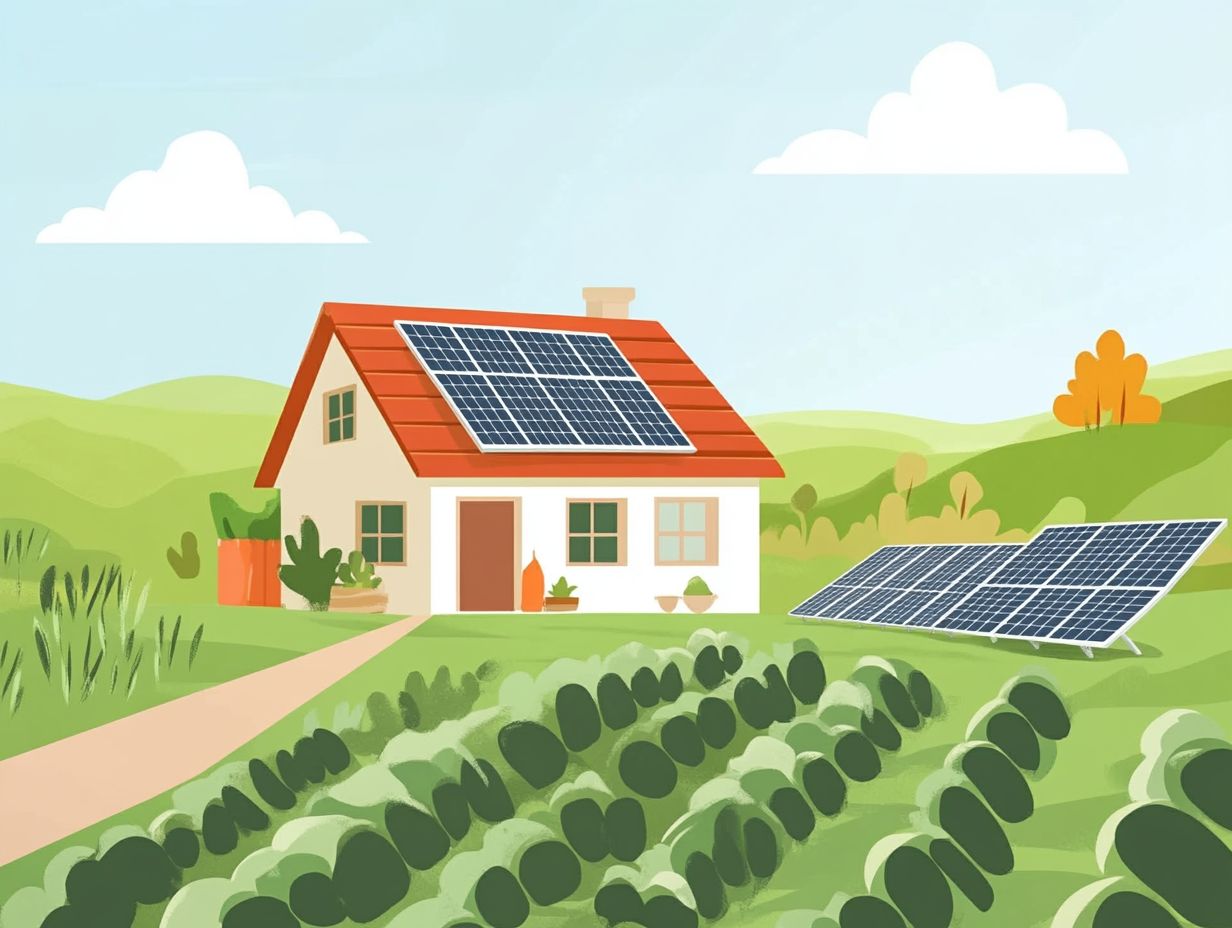
The initial costs of installing solar panels can vary based on several factors. These include system size, technology, and installation complexity.
However, these costs often lead to significant savings in the long run. By investing in solar technology, you can effectively reduce your energy expenses and improve your finances over time.
Several key elements come into play when determining these costs. The quality and type of equipment you choose can greatly influence both performance and durability.
Labor costs can also vary, depending on local rates and the expertise of the installation teams. Your geographical location is crucial; areas blessed with abundant sunlight and attractive government incentives can lead to lower overall expenses.
While the upfront investment may appear substantial, many homeowners are often thrilled to find that the savings add up over time, along with potential tax credits, making the transition to solar a financially savvy move.
How Can Rural Homes Benefit from Solar Energy?
Rural homes can unlock incredible savings with solar energy systems, capitalizing on abundant sunshine to reduce reliance on grid electricity and achieve true energy independence.
By embracing solar installations, you can tap into a reliable and sustainable power source, even from the most remote locations. This transition not only gives you the power to harness natural resources but also leads to substantial cost savings over time.
With lower monthly utility bills and the potential to earn credits through net metering a system that allows you to earn credits for excess solar energy you produce many homeowners discover that their investment pays off faster than anticipated.
Practical solar solutions, like rooftop panels and off-grid systems, are specifically crafted for rural environments, ensuring that you can maintain power for essential appliances, farming equipment, and even electric vehicles.
As a result, you gain greater control over your energy consumption and become less susceptible to the whims of fluctuating energy prices, ultimately enhancing your quality of life.
What Are the Common Misconceptions About Solar Energy?
Despite its growing popularity, numerous misconceptions about solar energy persist, which can often hold you back from fully embracing this sustainable technology.
Misunderstandings surrounding costs, efficiency, and maintenance can create barriers that prevent you from recognizing the immense benefits of solar solutions. You might think solar panels are prohibitively expensive, but the reality is that costs have been steadily decreasing, and a variety of financing options are available today to make it more accessible than ever.
Some may assume that solar technology doesn t work well in less sunny climates; however, advancements in design have significantly boosted efficiency levels, enabling reliable energy production even in diverse weather conditions.
Concerns about maintenance are often exaggerated as well; modern systems require minimal upkeep and typically come with warranties that ensure they function effectively for decades.
By understanding these factors, you can confidently make the switch to solar, contributing to both environmental sustainability and your financial savings.
How Can One Determine If Solar Energy Is Right for Their Rural Home?
To find out if solar energy suits your rural home, assess key factors like sunlight exposure and your energy needs.
Measure how much sunlight your property gets throughout the year. Understanding your energy consumption patterns is crucial, paying particular attention to peak usage times and seasonal fluctuations.
Logistics are equally important; examining your roof’s orientation and pitch, along with any potential shading from trees or nearby buildings, can significantly impact the efficiency of your solar panels.
Once you gather this essential information, diving into local regulations and available incentives will further refine your decision-making process, turning solar energy into a practical and beneficial choice for your rural lifestyle.
Frequently Asked Questions
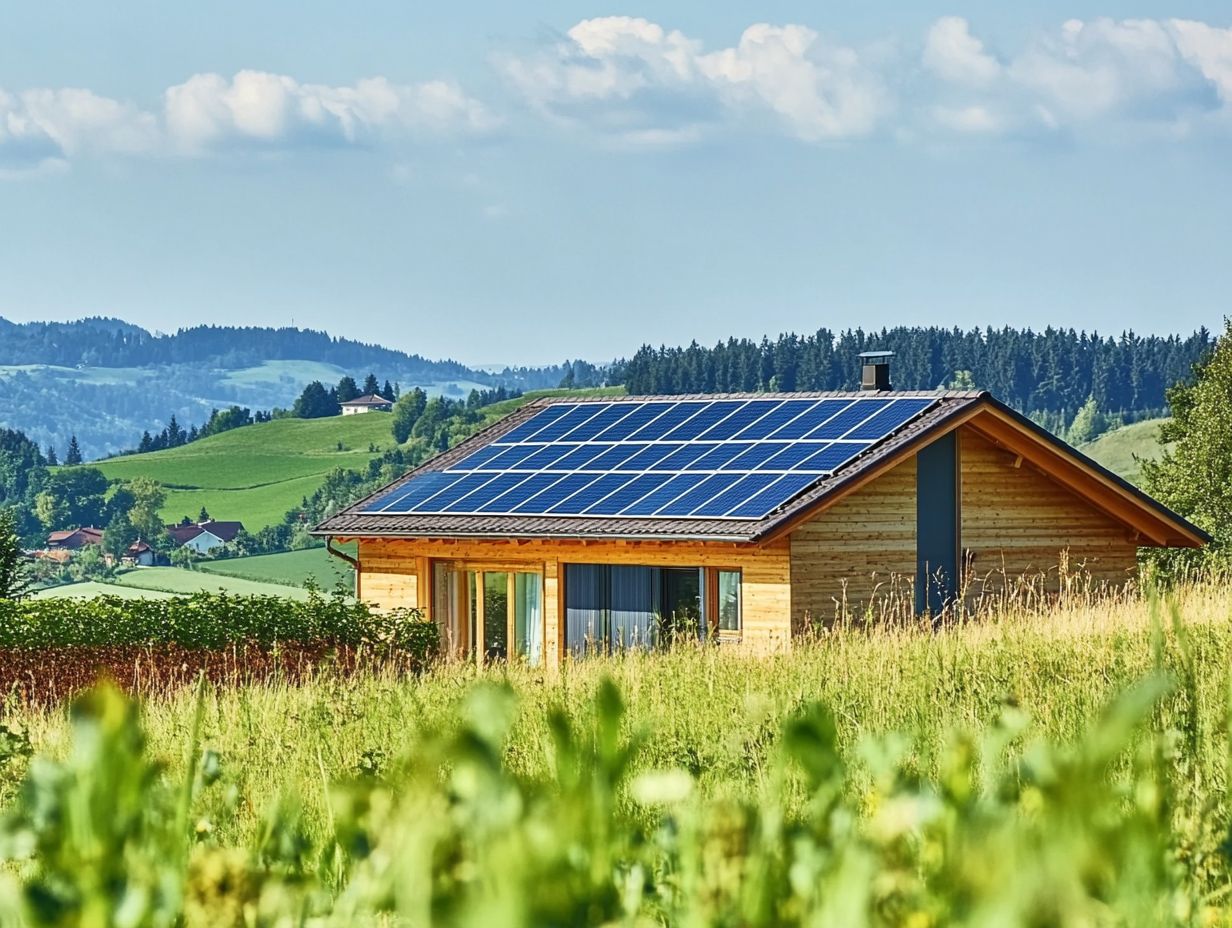
What is the benefit of using solar energy in rural homes?
Solar energy is clean, renewable, and cost-effective. It provides a great source of electricity for rural homes.
How can solar energy save money for rural homeowners?
With solar panels, you can cut electricity bills. Once installed, solar energy is free to use!
Can solar panels be set up in remote areas?
Absolutely! As long as there s enough sunlight, solar panels can work in remote areas.
What are the extra perks of using solar energy?
Solar panels need little maintenance and help reduce carbon emissions. They also boost property value!
How does solar energy supply reliable electricity?
By adding battery storage, solar panels can keep your home powered even during outages or cloudy days.
Are there incentives for installing solar panels in rural areas?
Exciting news! You can take advantage of federal, state, and local incentives to lower your costs!


